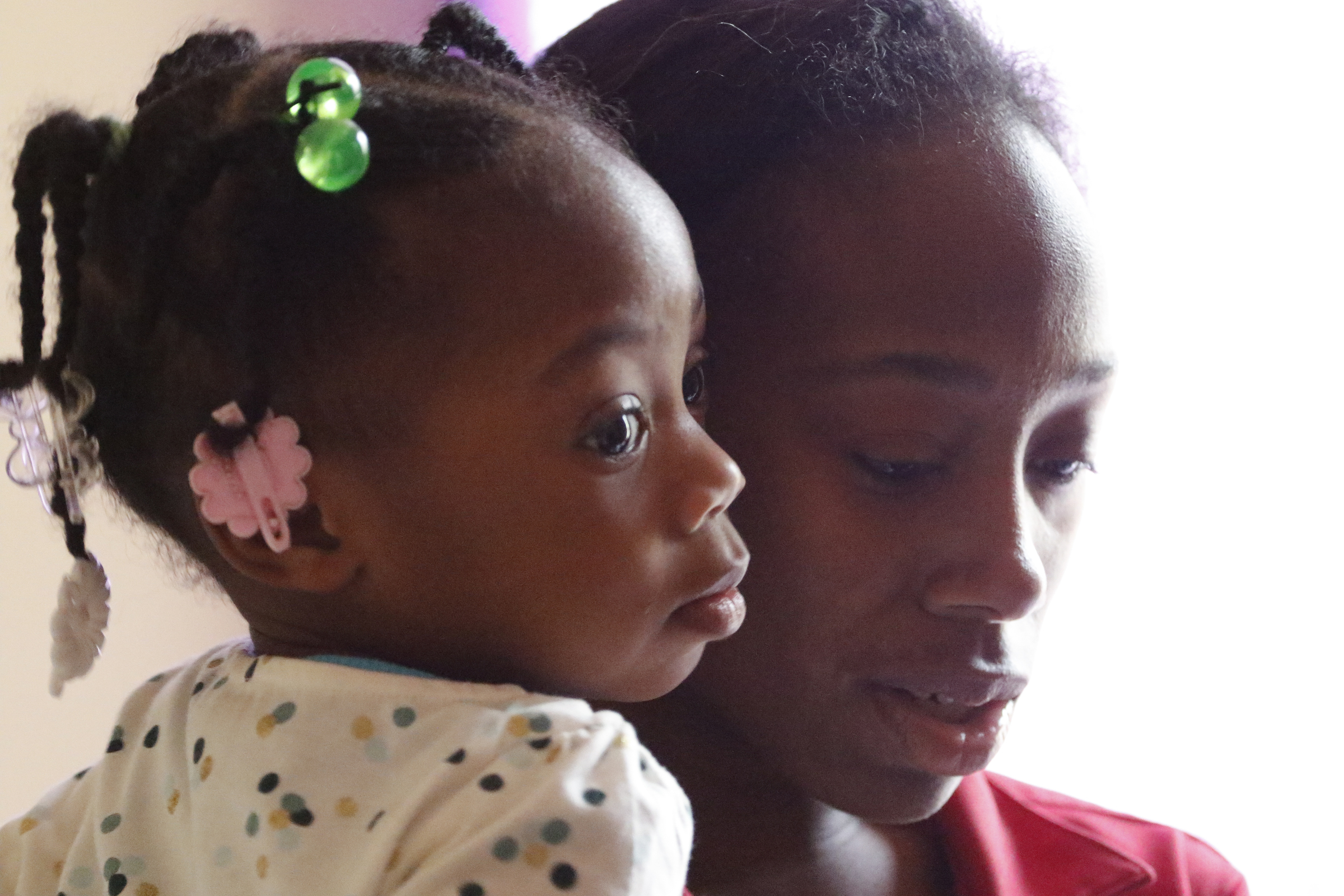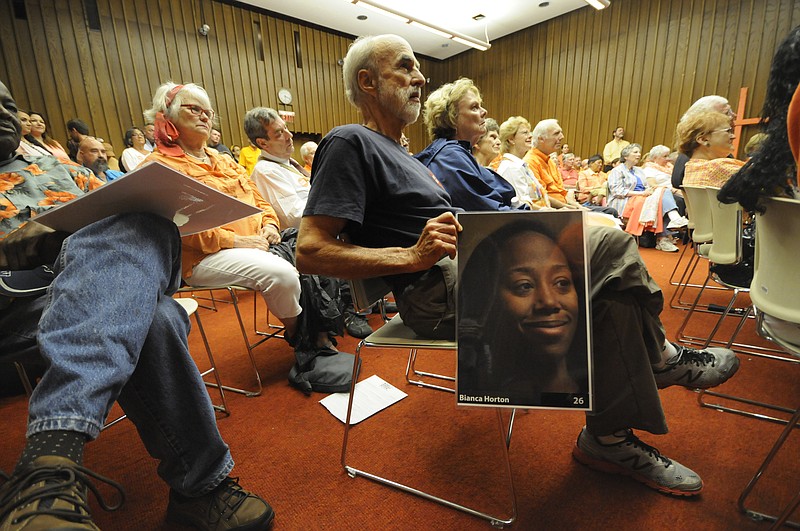 Two-year-old Zoey Duncan hugs her mother Bianca Horton in January 2016. On Jan. 7, 2015, a gunman opened fire in Horton's College Hill Courts apartment, killing 20-year-old Talitha Bowman and wounding three others, including Zoey, who barely survived. Zoey was paralyzed from the waist down. In May 2016, after testifying that Cortez Sims was the shooter, Bianca's body was found. She had been shot six times.
Two-year-old Zoey Duncan hugs her mother Bianca Horton in January 2016. On Jan. 7, 2015, a gunman opened fire in Horton's College Hill Courts apartment, killing 20-year-old Talitha Bowman and wounding three others, including Zoey, who barely survived. Zoey was paralyzed from the waist down. In May 2016, after testifying that Cortez Sims was the shooter, Bianca's body was found. She had been shot six times.Fund offers help for witnesses
A day after Bianca Horton was shot and killed in May 2016, presumably for testifying in a local murder case, Mayor Andy Berke decided the city would create a “Witness Protection and Victim Assistance Fund.”The fund doesn’t actually offer protection, it pays for practical, immediate expenses that can help a witness or victim quickly become safer, Assistant Chief Tracy Arnold explained. Police can use the fund to buy a bus ticket for a witness to go live with an uncle in another city, or to pay for gas so a family can drive out of state.Caroline Huffaker, a victim services coordinator at the police department, said the department strives to provide help that goes beyond the money by working with victims and witnesses to make a plan for safety that stretches beyond the first few days or weeks.City officials said five families have been helped with fund money, which started with $11,000 in private donations and is now down to $3,000. Berke said he hopes private donations will be able to sustain the fund, but hasn’t ruled out using city money in the future.To donate to the Witness Support Fund, visit connect.chattanooga.gov/witnessfund or send a check payable to United Way, for Witness Support Fund, to 100 E. 11th St., Chattanooga, Tenn., 37402.– Shelly Bradbury, staff writer
The Chattanooga Police Department will not immediately enforce a temporary court order that prohibits 31 men accused of being gang members from associating with one another in East Lake Courts.
Although Criminal Court Judge Barry Steelman approved a temporary "gang injunction" last month, authorities still need to train specific officers and develop policies and procedures before moving forward with the legal tool, police spokeswoman Elisa Myzal said last week.
"There are still a number of things to be done before enforcement can begin," Myzal wrote in an email. "A requirement of the injunction presented by the District Attorney's Office is to serve notice to all individuals named in the injunction. That is still a work in progress between [police], the Hamilton County Sheriff's Office and the DA's office."
When he unveiled the petition in September, Hamilton County District Attorney Neal Pinkston said the injunction would give police officers another legal tool to discourage violence among routine troublemakers who belong to two street gangs: the Grape Street Crips and the Gangster Disciples. An injunction is a court order that requires an entity to stop doing something, similar to a restraining order or a cease-and-desist letter.
In this case, Pinkston named 31 men authorities have been looking into since April 2016. Each can be fined $50 and spend up to 30 days in jail for violating a number of listed activities - including owning graffiti equipment, drinking alcohol, possessing guns and drugs, signaling the arrival of police, or hanging out with other accused gang members - once police start enforcing the injunction.
All Chattanooga officers - about 450 total - will receive training on the gang injunction policies and procedures once they are finalized, Myzal said. In the meantime, the department will begin with officers assigned to the Street Crimes Reponse Team and the Baker South patrol. Another 26 officers who work either full time or part time for the Chattanooga Housing Authority will be involved, too, said CHA police Chief Felix Vess. There's no timeline yet on how long that will take, Myzal said.
So far, 20 of the 31 men have been served with copies of the gang injunction and notices to show up in court, according to records filed in Criminal Court in December. Proper service has been such a prominent issue because Pinkston has argued that serving "managing agents" in each gang provides adequate notice for all the men. Defense attorneys, meanwhile, have countered that prosecutors never proved their clients are in gangs, let alone hold leadership positions.
During a checkup hearing last Tuesday, Steelman said he entered the temporary order in December after Pinkston approached him with a copy of it. A few weeks before, Pinkston made a formal request for it in open court.
"I assume we're at a point where you'll alert the court when you want to have a trial," Steelman said last Tuesday. He then set another checkup date for March 6 at 2 p.m. in Criminal Court.
Since the beginning, the men's defense attorneys have said the injunction would trample First Amendment rights to association, open the door to illegal searches, and widen the us-versus-them mentality that characterizes some relationships between minority communities and police officers. The 31 men can ask Pinkston to dismiss them from the injunction by "opting out," defense attorney Chrissy Mincy said.
To do so, the men must file a motion with Pinkston and declare in sworn testimony they have renounced any gang membership, the petition says. They also must truthfully declare they have not been arrested in the past two years; have not been in the company of any relevant gang members, other than family members; and have not gotten any gang-related tattoos in the last two years.
So why wouldn't all of the accused men jump at the opportunity?
"Because you've got to follow those procedures," Mincy said. "And not all of them fit. Some of them have been arrested [in the last two years], so they couldn't opt out if they tried."
Attorney John McDougal, who is representing one of the men, said he and his client have discussed the possibility of opting out. But publicly renouncing a gang is something to think twice about, McDougal said.
"They want them to do it publicly, and a lot of these folks don't want to attack the gang," he said. "They may not be members, but they're friendly with some of them. And you don't want to be seen as dissing the gang."
Email Zack Peterson at zpeterson@timesfreepress.com.
